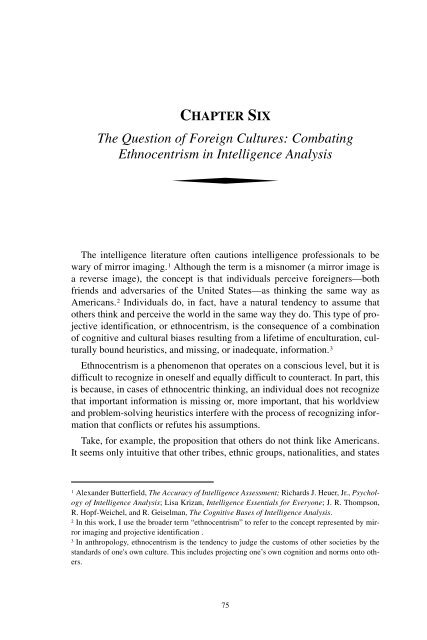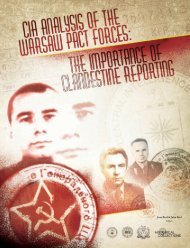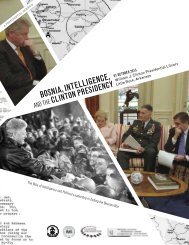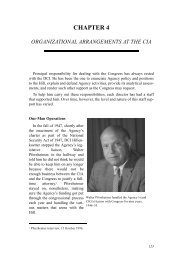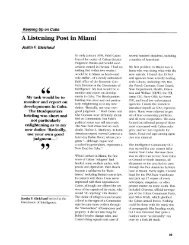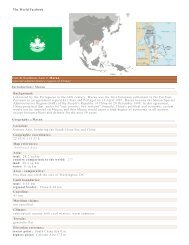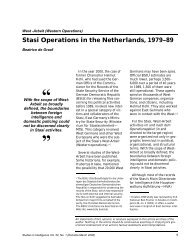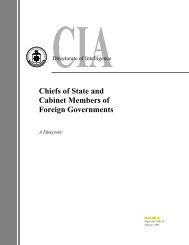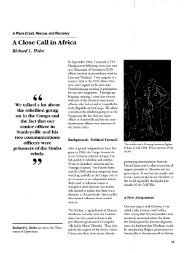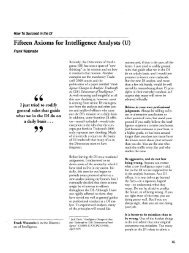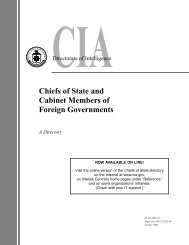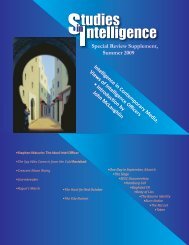Analytic Culture in the U.S. Intelligence Community (PDF) - CIA
Analytic Culture in the U.S. Intelligence Community (PDF) - CIA
Analytic Culture in the U.S. Intelligence Community (PDF) - CIA
You also want an ePaper? Increase the reach of your titles
YUMPU automatically turns print PDFs into web optimized ePapers that Google loves.
CHAPTER SIX<br />
The Question of Foreign <strong>Culture</strong>s: Combat<strong>in</strong>g<br />
Ethnocentrism <strong>in</strong> <strong>Intelligence</strong> Analysis<br />
The <strong>in</strong>telligence literature often cautions <strong>in</strong>telligence professionals to be<br />
wary of mirror imag<strong>in</strong>g. 1 Although <strong>the</strong> term is a misnomer (a mirror image is<br />
a reverse image), <strong>the</strong> concept is that <strong>in</strong>dividuals perceive foreigners—both<br />
friends and adversaries of <strong>the</strong> United States—as th<strong>in</strong>k<strong>in</strong>g <strong>the</strong> same way as<br />
Americans. 2 Individuals do, <strong>in</strong> fact, have a natural tendency to assume that<br />
o<strong>the</strong>rs th<strong>in</strong>k and perceive <strong>the</strong> world <strong>in</strong> <strong>the</strong> same way <strong>the</strong>y do. This type of projective<br />
identification, or ethnocentrism, is <strong>the</strong> consequence of a comb<strong>in</strong>ation<br />
of cognitive and cultural biases result<strong>in</strong>g from a lifetime of enculturation, culturally<br />
bound heuristics, and miss<strong>in</strong>g, or <strong>in</strong>adequate, <strong>in</strong>formation. 3<br />
Ethnocentrism is a phenomenon that operates on a conscious level, but it is<br />
difficult to recognize <strong>in</strong> oneself and equally difficult to counteract. In part, this<br />
is because, <strong>in</strong> cases of ethnocentric th<strong>in</strong>k<strong>in</strong>g, an <strong>in</strong>dividual does not recognize<br />
that important <strong>in</strong>formation is miss<strong>in</strong>g or, more important, that his worldview<br />
and problem-solv<strong>in</strong>g heuristics <strong>in</strong>terfere with <strong>the</strong> process of recogniz<strong>in</strong>g <strong>in</strong>formation<br />
that conflicts or refutes his assumptions.<br />
Take, for example, <strong>the</strong> proposition that o<strong>the</strong>rs do not th<strong>in</strong>k like Americans.<br />
It seems only <strong>in</strong>tuitive that o<strong>the</strong>r tribes, ethnic groups, nationalities, and states<br />
1<br />
Alexander Butterfield, The Accuracy of <strong>Intelligence</strong> Assessment; Richards J. Heuer, Jr., Psychology<br />
of <strong>Intelligence</strong> Analysis; Lisa Krizan, <strong>Intelligence</strong> Essentials for Everyone; J. R. Thompson,<br />
R. Hopf-Weichel, and R. Geiselman, The Cognitive Bases of <strong>Intelligence</strong> Analysis.<br />
2<br />
In this work, I use <strong>the</strong> broader term “ethnocentrism” to refer to <strong>the</strong> concept represented by mirror<br />
imag<strong>in</strong>g and projective identification .<br />
3<br />
In anthropology, ethnocentrism is <strong>the</strong> tendency to judge <strong>the</strong> customs of o<strong>the</strong>r societies by <strong>the</strong><br />
standards of one's own culture. This <strong>in</strong>cludes project<strong>in</strong>g one’s own cognition and norms onto o<strong>the</strong>rs.<br />
75


